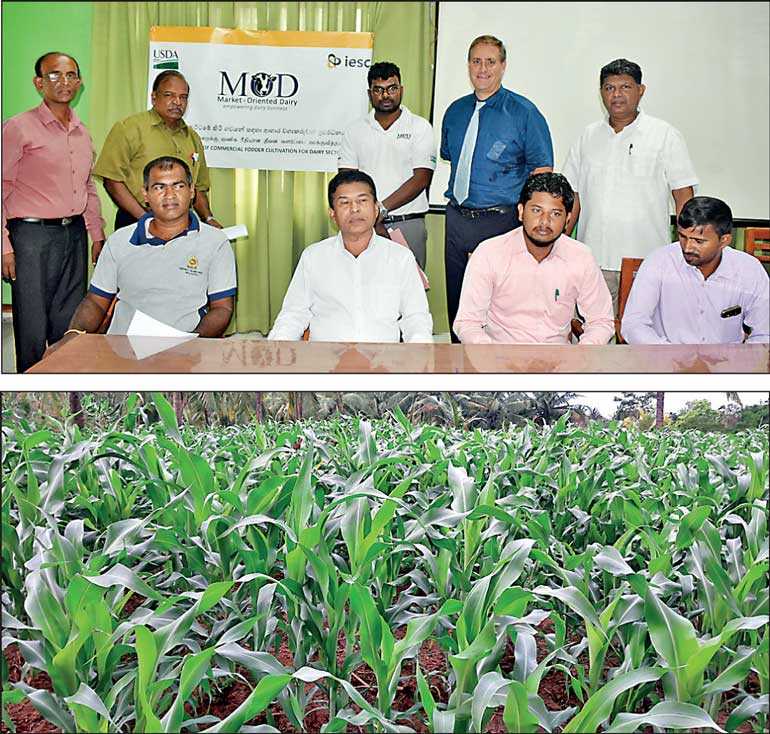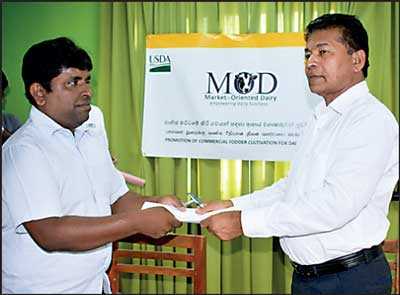Wednesday Feb 25, 2026
Wednesday Feb 25, 2026
Friday, 14 December 2018 00:00 - - {{hitsCtrl.values.hits}}

With its primary objective to strengthen and grow the country’s dairy sector, the Market-Oriented Dairy (MOD) Project announced the signing of a buyer-seller agreement between Lanka Forages Ltd. and fodder cultivators in the northern region recently. Considered the first of its kind in the northern region, the project will facilitate several other such agreements between fodder buyers and cultivators around the island. 
The main purpose is to ensure year-around availability of good quality fodder and silage at a competitive price, which is essential for dairy farmers to maintain a healthy, high-yield dairy herd and year-round milk production.
The Government of Sri Lanka aims to achieve self-sufficiency in milk production by 2022 and dairy is the most important sub-sector in the Sri Lankan livestock industry. Yet the country currently meets only about 40% of fresh milk demand locally and therefore enhancing dairy farmer productivity and overall dairy sector competitiveness is critical in fulfilling the national agenda.
To increase milk yield and assure year-round milking for dairy farmers, feed is identified as the most indispensable and basic input with fodder being a major component. Presently, very few farmers grow quality pasture and fodder to feed their animals, instead depending mostly on natural grasses growing on road sides and uncultivated public and private lands, which is highly inadequate in meeting the nutritional needs of dairy cows. Only a very small percentage of dairy farmers adopt fodder conservation methods such as making silage for better yields.
This limited availability of quality pasture and fodder, shortage of land in some areas for grass cultivation and managed cultivation, lack of knowledge on usage of silage, together with the seasonal variations in supply, creates a significant bottleneck in dairy production impacting all types of farms, such as small and large-scale farms including mega farms. Further, the scarcity of feed increases the feed costs for dairy farmers.
To address this need, MOD Project Director Matthew Krause said, “The interventions are designed in a holistic manner by a) educating farmers on the need for quality feed year-round to increase yield and b) creating awareness amongst stakeholders on the business opportunities around growing, conserving and selling fodder to potential cultivators to assure year-round supply of feed.”
Krause added, “Essentially we encourage both the dairy farmers and the fodder cultivators to think as entrepreneurs by providing training, enhancing technical knowledge on latest techniques and quality planting material and methodologies which are adaptable to local conditions as well as business planning.”
Lanka Forages Ltd. Managing Director Lionel Dharmasiri stated, “This is a unique business model for Sri Lanka. The agreement today fulfils a great need for the country to be able to supply fodder and silage at a competitive price. The other signatories and I sensed the growing market opportunity and have the confidence that there is a guaranteed market for commercial fodder cultivation assured with an agreed rate and time period.” This linkage was carried out with the guidance and support of Dr. Gowrithilan, Deputy Director of the Department of the Department of Animal Production and Health (DAPH) in Mullaitivu. On the invitation of the MOD Project, Ceylon Agro Industries and Wheel Master Ltd. presented new techniques in commercial fodder cultivation to the farmers in attendance.
MOD Business and Value Chain Director Asoka Kuruppu present at the signing and overall in charge of development of the inputs for the dairy sector, emphasised,
“We will be facilitating similar such partnerships around the island in areas where there is a significant presence of dairy farmers. Entrepreneurs interested in becoming commercial fodder cultivators with intent to sell to dairy farmers with minimum land extent of two acres (or a cluster of smaller acreages) with road access and water available throughout the year are welcome to contact us via email on [email protected] or 0112-676-221.”